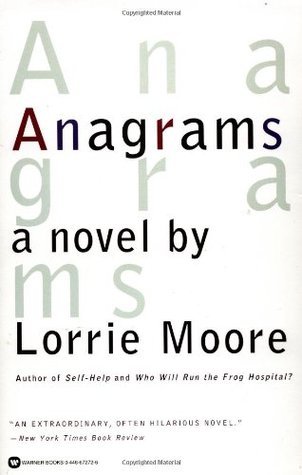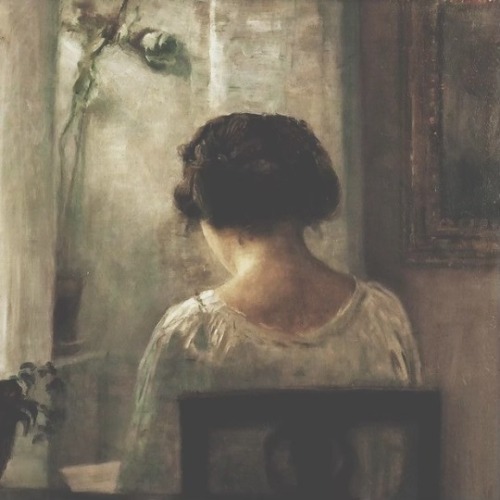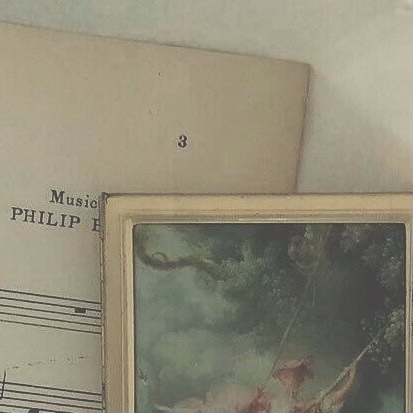#lorrie moore

It feels important that I read Anagrams in January. For me, seasonal-affective and hyper aware of holidays’ end, it was a month to contemplate possible lives. The month in retrospect feels made entirely of my commute to and from work. Something about that public transit experience—the tender walls each person made, the silence of a D.C. Metro car filled entirely with 9-to-5ers, the quiet cracking of ice under a thin film of snow. All the gray skies.
The landscape of Anagrams is much like those days. The book in my mind is a putty gray with flashes of brightness, uncolored insights mimicking light. Moore’s choice of structure—five sections, each outlining different lives lived by the same core of characters—makes each light a hook to a layer below, a snatch of song you remember but have not understood. There is Benna, whom I would call an everywoman if she weren’t an every-one-of-us, blinkered by love, dissociated and close at once. Her friend, Eleanor, brash and hilarious. Gerard, who flashes from being Benna’s love interest to loving Benna between the stories, and never both at once. In the final part only, George, or Georgianne, Benna’s daughter, “an angel, a beautiful child ghost.”
Throughout the book, there are echoes that make us sure the five Bennas are the same somewhere fundamental. In her long nights and mournings, Benna sometimes runs to the street. In “Strings Too Short to Use” she says,
Only once, and very late at night, did I run downstairs and out into the street with my pajamas on, gasping and watering, waiting for something—a car? an angel?—to come rescue or kill me, but there was nothing, only streetlights and a cat.
—and in “Yard Sale,”
As medication, I will watch a lot of HBO and eat baked apples with sour cream. The whites of my eyes will chip and crack with scarlet. Only once or twice will I run out into the street, in the middle of the night, with my pajamas on.
And there are, of course, the anagrams, the combinations of phonemes with which Benna tries to make something mean another. She says, “There was a period where I kept trying to make anagrams out of words that weren’t anagrams: moonscapeandmenopause;gutlessandguilts;lovesickandevil louse”; she says, “My sentences become anagramsof the sentences before”; she says,
When I was little, I didn’t understand that you could change a few sounds in a name or aphrase and have it mean something entirely different. When I told teachers my name was Benna and they said, “Donna who?” I would say, “Donna Gilbert.” I thought close was good enough, that sloppiness was generally built into the language. I thought Bing Crosby and Bill Cosby were the same person. That Buddy Holly and Billie Holiday were the same person. That Leon Trotsky and Leo Tolstoy were the same person. It was a shock for me quite late in life to discover that Jean Cocteau and Jacques Cousteau were not even related. Meaning, if it existed at all, was unstable and could not survive the slightest reshuffling of letters. One gust of wind and Santa became Satan. A slip of the pen and pears turned into pearls. A little interior decorating and the worldbecameher twold, an ungrammatical and unkind assessment of an aging aunt in a singles bar. Add a d to poor, you got droop.It was that way in biology, too. Add a chromosome, get a criminal. Subtract one, get an idiot or a chipmunk. That was the way with things. When you wanted someone to say “I love you,” approximate assemblages—igloo, eyelid glue, isle of ewe—however lovely, didn’t quite make it.
And that brings us to love, where Moore most devastates us. It hurts not because it is a love story but because it almost isn’t. Moore’s thematic focus hovers where love fails and where it is cruel, as in the first section, called “Escape from the Invasion of the Love-Killers”:
It was, after all, easier to leave something you truly, serenely loved than something you really and frantically didn’t quite.
In the third, “Yard Sale”:
Once I found a fairly new book of poems in a used bookstore, and on the inside cover someone had written, “For Sandra, the only woman I’ve ever loved.” I blushed. I blushed for the bitch Sandra. Betrayals, even your own, can take you by surprise. You find yourself capable of things.
And then in the same section:
And on the phone in California, in one final, cornered burst of erotic sentiment, he will whisper, “Good night, Benna. Hold your breasts for me,” but the connection won’t be very good and it will sound like “Hold your breath for me,” and I’ll say “You’re out of your mind, baby doll,” and hang up with a crash.
It’s what Benna calls “Anguish-as-a-Second-Language.” It’s the kind of thing Thomas Hardy would call “Crass Casualty.” It’s magnetic, unhelpable, multiply undercut by Benna’s refrain in the fifth section, “The Nun of That”:
Life is sad. Here is someone.
“The Nun of That” really makes up most of the novel. Not only is the section nearly three-fourths of the book, but its thematics best help us understand. Benna, a poetry professor at a community college in this particular section, feels the part of words in the act of loving:
Words, I think, words are all you need for love—you say them and then just for the hell of it your heart rises and spills over into them. My idea in a love affair is that if someone makes enough declarations, one of them is bound to come true.
She even seems to understand her other lives, as if the novel is something she herself has written.
Sometimes as I’m drifting toward sleep, in the beginnings of that dissolution, I wonder where I am, when this is, and realize that at these moments I could be anywhere, anytime, for all I know: eight and napping in the trailer, my broken arm in a cast, or thirteen at night clutching a pillow to my neck, or twenty in the arms of my boyfriend, or twenty- seven in the arms of my husband, or thirty-three next to my imaginary daughter; at every place in the whole spinning shape that is my life, when I am falling asleep, I am the same person, the identical awareness, the same fuzzball of mind, the same muck of nerves, all along the line. I forage through my life and everywhere—there, there, and there—it is only me in it, the very same me, the same harmless lump, the same soggy weirdo, the same sleeping, breathing bun.
And if not the other lives, she mouths Moore’s intentions:
“You know,” says Eleanor, “if I were to write a book, it would be filled with womensitting around having lunch, talking like this—about God and diaphragms and Middlemarch. After every lunch they’d all take out their compacts at the table and reapply their lipstick together. What would you write?”
“Oh, I don’t know. Maybe I’d call it Split Infinitives and load it up with a lot of divorces. Then at the end I’d have it be like To the Lighthouse, where all human life is suddenly lifted up out of the book and vanished, only an old house at the end, with English weeds tapping at the glass.”
Eleanor nods and smiles. “That’s depressing.”
“Yeah, I guess if it was too depressing I’d add a knock-knock joke.”
Benna believes things that aren’t real. When she admits this, at the book’s end, I wanted to take up the mantle, to do the work of believing for her. She understands that
This is why a woman makes things up: Because when she dies, those lives she never gotto are all going down with her. All those possibilities will just sit there like a bunch of schoolkids with their hands raised and uncalled on—each knowing, really knowing, the answer.
Life is sad. Here is someone.
Moore examines the possible in Anagrams, both the side-by-side—the anagram, the recombinant—and the completely different. She shows us our different lives, parallel, what little exercises in potential we can understand. Finishing, I felt removed from love itself—as if reading the shaken-up possibilities of a love story made me a part of none, not even my own, not even what was real. I felt poked out in the winter air when I finished the book on the city bus, and as I unlocked my apartment’s deadbolt what was in me was cold, and was smarting. “My heart hurts,” like Benna’s, “spreads, folds over like an omelette.”
Review by Emma Aylor.
Moodboard: An Aquarius Winter Book List.
- Self Help by Lorrie Moore.
- The Goldfinch by Donna Tartt.
- Extremely Loud & Incredibly Close by Jonathan Safran Foer.
- The Beauty of the Husband by Anne Carson.
- The Ladies of Grace Adieu by Susanna Clarke.
Post link






